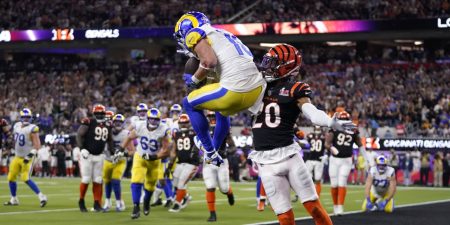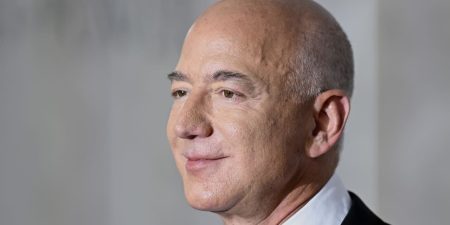Technology stocks are staring down earnings season and a Federal Reserve decision, both of which could be sobering, after riding the high of a monthslong rally.
Animal spirits and artificial intelligence helped the Nasdaq gain a third in value this year, but second-quarter earnings could bring investors back to reality with Microsoft, Alphabet, Meta, and more due to report next week.
Already there’s a high bar: 74% of S&P 500 constituents have beaten earnings expectations, but only 52% of stocks rose after results, according to Dow Jones Market Data. Even good earnings could see tech stocks fall.
Meanwhile, a pivotal Fed decision looms on Wednesday, with likely the last interest-rate hike in a generational cycle of monetary policy tightening. With rates at 5.25% and set to go higher—to say nothing of whatever hawkish language Fed Chairman Jerome Powell could surprise markets with—it might be a fighting-the-Fed moment that tech struggles to battle this time.
Tech stocks are already looking shaky and it could be a watershed moment for sector sentiment. Chip maker TSMC’s outlook and rising bond yields contributed to a 2.1% drop for the Nasdaq on Thursday, while the Dow notched its longest winning streak (nine days) since 2017. The blue-chip index recorded its biggest one-day outperformance of the tech benchmark since March 2021.
More evidence of shifting sands comes from bank stocks, already beat up this year after the worst string of lender failures since the 2008-09 financial crisis. Banks delivered a mixed bag of results this week but shares climbed anyway—tech-like behavior—while techy names such as Tesla and Netflix plunged following earnings that were actually pretty fine related to analyst expectations.
Such a topsy-turvy reaction is a sign of what could come next week: an at-risk tech rally with Dow stalwarts suddenly looking better.
—Jack Denton
*** Join Investor’s Business Daily multimedia content editor Alissa Coram and news editor Ed Carson today at noon when they talk about the artificial intelligence theme that has taken the stock market by storm. They will share how to filter through the noise to find AI stocks with the most potential for big gains over the long run. Sign up here.
Try your hand at the Barron’s crossword puzzle and sudoku games, now running daily along with a weekly digital jigsaw based on the week’s cover story. To see all puzzles, click here.
***
D.R. Horton Beats Expectations Amid New Home Demand
D.R. Horton,
a home builder focused on creating entry-level housing, beat expectations for the fiscal third quarter and raised its full-year outlook on Thursday. There is still a robust market for affordable, newly built homes amid a shortage of existing homes for sale and high mortgage interest rates.
- D.R. Horton’s profit of $3.90 a share handily beat Wall Street estimates, but is still a 16% decline from the same quarter last year. Revenue rose 11%, to $9.7 billion. It sees fiscal year revenue of $34.7 billion to $35.1 billion, also above forecasts.
- Despite higher mortgage rates and inflation, net sales orders increased 37% from the same time last year, as the supply of both new and existing homes at affordable prices remained limited and demographics supporting demand remain favorable, said Chairman Donald Horton.
-
Homeowners are unwilling to sell only to take on a new higher rate mortgage. This has boosted home builders, lifting their stocks and creating an imbalance between new and existing home sales. The
SPDR S&P Homebuilders ETF
is up 41% this year, compared with the S&P’s 20% gain. - Existing-home sales fell 3.3% in June from the prior month. Analysts predict that trend will continue for the rest of the year, signaling a further slowdown in the existing home market and spearheading stubbornly high prices.
What’s Next: The housing market has been affected by the Federal Reserve’s interest rate hikes, pushing mortgage rates above 6% this year and remaining elevated. The 10-year Treasury yield, which often rises and falls with mortgage rates, was climbing on Thursday ahead of next week’s Fed meeting.
—Shaina Mishkin, Adam Clark, and Hannah Ziegler
***
Labor Unions Stirring as Possibility of More Strikes Looms
Labor unions are stirring, with hundreds of thousands of workers already out on strike or threatening one, including Hollywood writers and actors and workers at logistics giant
UPS
and the Big Three auto makers in Detroit. Unions are demanding better pay and protections from new technologies such as artificial intelligence.
- At UPS, the International Brotherhood of Teamsters members have authorized a strike as early as Aug. 1 after talks broke down on July 5. The contract under dispute covers 340,000 delivery and warehouse logistics workers.
- UPS and Teamsters resume negotiations next week. Workers want a new five-year agreement with better pay, more full-time jobs, and workplace safety improvements. UPS said it’s prepared to raise pay but needs to “work quickly to finalize a fair deal.”
-
United Auto Workers said its nearly 150,000 members are prepared to strike if
Ford Motor,General Motors,
and
Stellantis
don’t meet their demands. Contracts expire in September. President Joe Biden met privately with UAW leader Shawn Fain on Wednesday after contract negotiations began this month. - Broadway crew members including stagehands and wardrobe and makeup artists reached a tentative agreement for a new contract with theater owners on Thursday as they were voting on whether to authorize a strike. The union is involved in 28 Broadway shows and numerous other productions.
What’s Next: The share of U.S. private sector jobs that are unionized has fallen to 6% from about 25% 50 years ago. Success for union members this time around could mean a boost for organizing efforts at places such as
Amazon.com
and
Starbucks.
—Liz Moyer
***
AMC Entertainment Drops Plan to Charge More for Best Seats
AMC Entertainment Holdings
is dropping a plan to charge more for the best seats in its movie theaters. But it is moving forward with another plan to make seats in the front row (typically the least desirable) more attractive.
- AMC courted criticism when it announced the premium pricing plan in February. But its pilot program showed most people continued to pay for premium seats, even if the tickets were more expensive, and there was no change to sales of front-row seats, even with a discount.
- It now plans to make the front row more comfortable, with lounge-style, fully reclining seats that make the angle from the area to the screen less awkward for viewers. It didn’t say if pricing would change.
- AMC and other theater chain operators have been struggling to rebound from the Covid-19 pandemic, when movies were shut down and media giants turned to at-home streaming to keep audiences. Theater ticket sales are down about 20% this year from 2019.
-
The announcement comes as
Warner Bros. Discovery’s
Barbie and Comcast-owned Universal’s Oppenheimer are having their opening weekends, with Barbie’s estimated ticket sales of $140 million and Oppenheimer’s $60 million. Movie fans are calling the double debut “Barbenheimer.”
What’s Next: AMC said it would end the premium pricing test at theaters sometime in August, which means the added pricing scheme for the best seats is still in place this “Barbenheimer” weekend at the AMC theaters testing it.
—Connor Smith and Liz Moyer
***
SAP Flags AI Opportunities But Misses Street Earnings Estimates
SAP reported second-quarter results that were shy of Wall Street estimates. But the German enterprise software giant flagged significant opportunities ahead “through the transformative power of AI.”
- For the quarter ended in June, SAP posted revenue of 7.5 billion euros, or $8.35 billion, up 5%, or 8% adjusted for currency, falling short of the Wall Street consensus forecast as tracked by FactSet at €7.6 billion. Profit on an adjusted basis was €1.07 a share, below consensus of €1.17 a share. Under standard accounting, the company earned €0.62 a share..
- SAP, which sells financial, human resources, and logistics software to large enterprises, continues to push customers to switch to cloud versions of its products. Cloud revenue in the quarter was €3.3 billion, up 19% or 22% in constant currency.
- In an interview with Barron’s, SAP Chief Financial Officer Dominik Asam said results in the quarter were affected by some headwinds in the company’s more transactional businesses, noting caution on behalf of some customers caused some projects to slip from the second quarter to the third quarter.
What’s Next: Earlier this week, Microsoft stock reached a record high after it announced pricing for a new AI subscription and SAP seems to be considering something similar. Asam told Barron’s the company is considering various models for how to go to market with new AI tools. He noted that “AI is not something you get for free, the value can be very significant and we will price accordingly.”
—Eric Savitz
***
Things You Could Have Bought This Week, But Didn’t
It’s been a busy week for big and small spenders. A single winning ticket for the sixth-largest Powerball jackpot in U.S. history was sold in Los Angeles. The unnamed winner gets the $1.08 billion grand prize, or $558.1 million as a lump sum, for the $2 ticket.
- At auction this week, an original 2007 iPhone sold for nearly $200,000, shattering a record as the most expensive Apple product ever. The rare 4GB, factory-sealed device received 28 bids. All 4GB iPhone models were discontinued in 2007 after their first few months on the market.
- The hockey stick that Edmonton Oilers star Wayne Gretzky used in his final Stanley Cup win over the Boston Bruins in 1987-1988 is up for sale by Sotheby’s, which expects it to fetch $500,000. The auction started Tuesday and goes to July 25.
- A collection of 300 model cars sold for £20,000 ($26,000) in the U.K. this week. The scale replicas include pre-1939 racing cars, the BBC reported Thursday. Each car was sold individually, with most selling for between $140 and $150.
- Princess Diana’s red and white “Black Sheep’” sweater, which she wore to one of Prince Charles’ summer polo matches in 1981, will be auctioned by Sotheby’s later this summer. It is expected to fetch at least $80,000.
What’s Next: Those who missed out on the Powerball jackpot have a chance at redemption in tonight’s Mega Millions draw, the other multistate lottery in the U.S. The grand prize has also been growing, reaching $720 million, the fifth-highest in its history.
—Hannah Ziegler
***
Do you remember this week’s news? Take our quiz below to test your knowledge. Tell us how you did in an email to [email protected].
1. Netflix posted a surprise surge in subscribers in the second quarter, adding 5.89 million, and saying it expects third-quarter net subscriber adds to be about the same. Why is it gaining viewers?
a. A sweepstakes offer for new sign-ups
b. A crackdown on password sharing
c. Hours of new content scheduled for the fall
d. None of the above
2. China’s second-quarter growth was unexpectedly weak, casting doubt on the recovery of the world’s second-largest economy from Covid-related lockdowns. How much did its GDP grow from April through June?
a. 0.8%
b. 1.0%
c. 1.2%
d. 1.4%
3. A brutal heat wave is persisting across wide swaths of the U.S., Southern Europe, the Middle East, and Asia, with days of record-setting high temperatures disrupting tourism and straining power grids. Phoenix hit 119 degrees on Wednesday, the highest since when?
a. 1987
b. 1997
c. 2007
d. 2017
4. A pair of potentially blockbuster movies are debuting this weekend as Hollywood bets big on people returning to theaters. Warner Bros. Discovery’s Barbie is up against Comcast-owned Universal’s Oppenheimer, a double-feature movie fans are calling which name?
a. Oppenarbie
b. PinkBomb
c. Barbenheimer
d. Boppenheimer
5. AT&T said lead-sheathed cables make up only a small part of its wireline network after The Wall Street Journal reported about how telecoms abandoned a sprawling network of lead-sheathed cables. Fears about potential liability sent AT&T’s stock to its lowest level since when?
a. February 1993
b. August 1998
c. February 2003
d. August 2008
Answers: 1(b); 2(a); 3(d); 4(c); 5(a)
—Barron’s Staff
***
—Newsletter edited by Liz Moyer, Patrick O’Donnell, Rupert Steiner
Read the full article here















